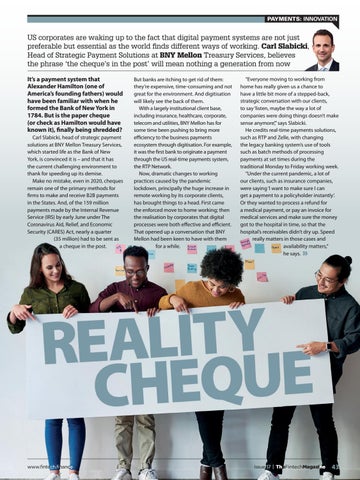PAYMENTS: INNOVATION
US corporates are waking up to the fact that digital payment systems are not just preferable but essential as the world finds different ways of working. Carl Slabicki, Head of Strategic Payment Solutions at BNY Mellon Treasury Services, believes the phrase ‘the cheque’s in the post’ will mean nothing a generation from now It’s a payment system that Alexander Hamilton (one of America’s founding fathers) would have been familiar with when he formed the Bank of New York in 1784. But is the paper cheque (or check as Hamilton would have known it), finally being shredded? Carl Slabicki, head of strategic payment solutions at BNY Mellon Treasury Services, which started life as the Bank of New York, is convinced it is – and that it has the current challenging environment to thank for speeding up its demise. Make no mistake, even in 2020, cheques remain one of the primary methods for firms to make and receive B2B payments in the States. And, of the 159 million payments made by the Internal Revenue Service (IRS) by early June under The Coronavirus Aid, Relief, and Economic Security (CARES) Act, nearly a quarter (35 million) had to be sent as a cheque in the post.
www.fintech.finance
But banks are itching to get rid of them: they’re expensive, time-consuming and not great for the environment. And digitisation will likely see the back of them. With a largely institutional client base, including insurance, healthcare, corporate, telecom and utilities, BNY Mellon has for some time been pushing to bring more efficiency to the business payments ecosystem through digitisation. For example, it was the first bank to originate a payment through the US real-time payments system, the RTP Network. Now, dramatic changes to working practices caused by the pandemic lockdown, principally the huge increase in remote working by its corporate clients, has brought things to a head. First came the enforced move to home working; then the realisation by corporates that digital processes were both effective and efficient. That opened up a conversation that BNY Mellon had been keen to have with them for a while.
“Everyone moving to working from home has really given us a chance to have a little bit more of a stepped-back, strategic conversation with our clients, to say ‘listen, maybe the way a lot of companies were doing things doesn’t make sense anymore’,” says Slabicki. He credits real-time payments solutions, such as RTP and Zelle, with changing the legacy banking system’s use of tools such as batch methods of processing payments at set times during the traditional Monday to Friday working week. “Under the current pandemic, a lot of our clients, such as insurance companies, were saying ‘I want to make sure I can get a payment to a policyholder instantly’. Or they wanted to process a refund for a medical payment, or pay an invoice for medical services and make sure the money got to the hospital in time, so that the hospital’s receivables didn’t dry up. Speed really matters in those cases and availability matters,” he says.
Issue 17 | TheFintechMagazine
43
